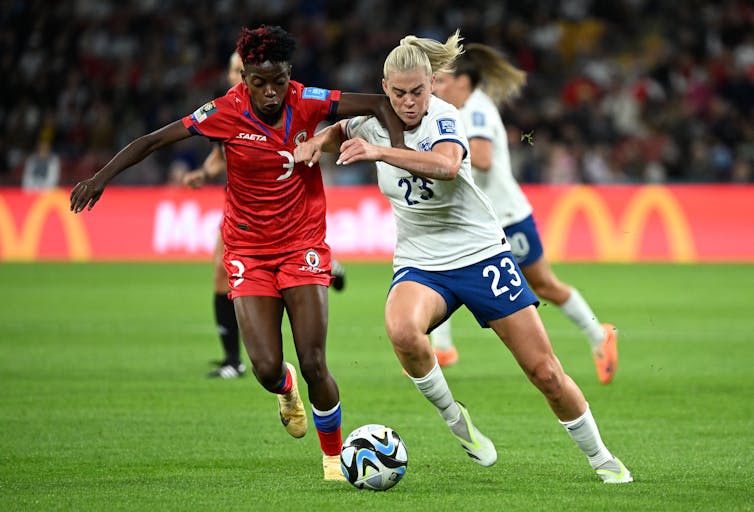As the Women’s World Cup grows in size and stature, it’s not surprising concerns are also being raised about match-fixing and the integrity of the sport.
Women’s sport has traditionally not been considered high risk when it comes to match-fixing for a few reasons, including the few gambling options available to punters.
For example, when Australia hosted the men’s AFC Asian Cup and Cricket World Cup in 2015, the Australian Federal Police laid out plans for countering the risk of organised crime infiltration and match-fixing. The women’s Netball World Cup, which also took place in Australia that year, did not feature in its preparations because it was deemed “low risk”.
By the time the FIFA Women’s World Cup was held in France in 2019, however, the football governing body was not taking any chances. It established a monitoring hub for the tournament and worked with Interpol, the French police, France’s betting regulator and financial crime prosecutors to develop the best strategies for preventing any match-fixing incidents.
A similar task force has been set up for this year’s Women’s World Cup in Australia and New Zealand, including the FBI, Interpol, the UN Office on Drugs and Crime, Sport Integrity Australia, the New Zealand Police and Sportradar, a sport betting data provider.
As sports lawyer Laura Douglas warned in a 2016 analysis on match-fixing, the increasing commercialisation and globalisation of women’s sport – coupled with the poor pay and lack of other support services offered to players – has created a powder keg waiting to explode.
Long-range goals: can the FIFA World Cup help level the playing field for all women footballers?
Gambling companies are not only increasingly taking bets on women’s professional sports – millions were wagered on matches at the 2019 Women’s World Cup – but also in community-level sporting events and competitions involving minors.
Sportradar, which provides betting data to bookmakers and analyses the betting markets for potential match-fixing, found that half the suspicious cases it identified in domestic leagues in 2021 came from third-tier leagues or lower, including regional and youth football. The report said:
Many of these competitions lack key integrity protections like bet monitoring and athlete education, making them vulnerable targets for match-fixers.
Pay disputes in women’s football
The most vulnerable athletes are those who are not paid a fair wage or in a timely manner. Unfortunately, in women’s football, this is a major problem.
For this year’s World Cup, several members of the Nigerian women’s team, the Super Falcons, were contemplating a boycott of their first match due to a pay dispute.
The gender pay gap for the FIFA World Cup is US$370 million. It’s time for equity
The team had previously protested at the 2019 Women’s World Cup and last year’s Africa Cup of Nations over payments the players said they were owed by the federation.
The coach, Randy Waldrum, had also accused the Nigerian Football Federation of not properly supporting the team and interfering in his squad selections.
Nigeria’s opponent in its opening game, Canada, was also involved in a pay dispute with its federation, as were Jamaica and South Africa.
Morgan Hancock/AAP
Why collective bargaining agreements are key
In 2015, the Australian women’s team, the Matildas, went on strike in an effort to increase the minimum wage they were paid and improve conditions for the national team (and later national league players).
It took another four years before the Professional Footballers Australia, the players’ union, and Football Australia were able to sign a new collective bargaining agreement, which would guarantee an equal split of all commercial revenue between the men’s and women’s national teams.
However, the Professional Footballers Australia has chosen not to follow the US model of pooling the prize money offered at the World Cup and dividing it equally among the men’s and women’s teams. The union believes this won’t address the inequity created by FIFA, which it could right with a stroke of the pen. (Prize money at the current Women’s World Cup has increased substantially, but is still a quarter what the men received at the 2022 men’s World Cup.)
Changing the culture within FIFA might be a challenge. One high-ranking football official, FIFA vice president Alejandro Dominguez, is quoted as saying he “doesn’t believe in equal pay” at the Women’s World Cup.
There was some progress at this year’s World Cup, though, with FIFA agreeing to pay all players at least US$30,000 individually.

Darren England/AAP
The Matildas, together with the Australian players’ union, are now calling on FIFA to increase its resourcing for women’s football around the globe. They have particularly highlighted the need for union representation and collective bargaining agreements that guarantee minimum standards and pay.
And for its part, FIFA should be demanding accountability from its member federations on how the money it gives each country is used to support women’s football.
Nearly a decade ago, I argued that creating a stronger culture around integrity in sport will produce a better product on the field. Players will be less vulnerable to bribery, removing the temptation to deliberately throw a game.
Teams need to take a “winning well” approach, similar to the one adopted by the Australian Institute of Sport, which replaces the purely economic devaluation of athletes as “assets” with a more humanistic and inclusive approach that focuses on wellbeing and ethics of care.
If these recommendations are implemented internationally, it will go a long way to supporting the women’s game and strengthening integrity.


